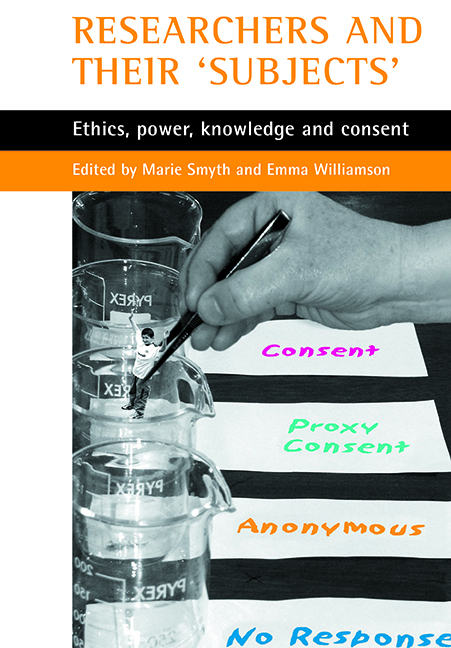Conclusion
Published online by Cambridge University Press: 20 January 2022
Summary
This edited collection has examined the relationship between researchers and those they research from an ethical perspective. From the first chapter written by the Strategies for Living Project, it is demonstrated that the very terms ‘researcher’ and ‘participant’ create a distinction that is not always present in real life. Participants and service-users can be researchers and, as acknowledged in Chapter Eight, researchers can also be participants. By seeking to conduct research that addresses the relationship between researchers and participants, a number of contributors have demonstrated how the distinction between those involved in the research process can be broken down, challenged and as a result, more reflexive research can be accomplished. But why is that important?
A number of methods of inclusion have been described in this book including the use of service-user researchers, reference groups, stakeholder boards of directors and consultative feedback methods. An examination of these methods demonstrates how the nature of the relationship between the researcher and participant impacts directly on the methodological and epistemological characteristics of the research itself. Within disciplines where positivistic and strict notions of epistemological and methodological rigour exist (for example, within epidemiological research outlined in Chapter Nine by John Henderson), the strict differentiation between researchers and participants (subjects) remains. That is not to say, however, that such research is less inclusive or ethical. Such research undergoes rigorous ethical governance processes where lay representation is mandatory, whereas such rigour in ethical review is largely absent in the social sciences in general, for example.
By looking at governance and control across the disciplinary divide, this collection illustrates discrepancies in the current system. This is most apparent in direct comparison between specific chapters. For example, Nelson (Chapter Five) explores the problems that can occur in the governance process when certain groups in society are not represented on research ethics committees. This was also an issue for the Strategies for Living Project (Chapter One), although those fears proved unfounded, and for Cameron et al (Chapter Six). Other researchers did not encounter this problem, not because the subject of their work was less of an emotional risk to participants, but because the location of the research was different, and they did not have to submit to a third-party ethical review process such as that experienced by Nelson, Henderson and others in this volume.
- Type
- Chapter
- Information
- Researchers and their 'Subjects'Ethics, Power, Knowledge and Consent, pp. 211 - 216Publisher: Bristol University PressPrint publication year: 2004



